A Collaborative Report on WEN’s Environmental Hackathon
By WEN Board Members and Elaine Westcott, guest blogger
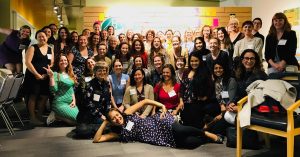
Women are underrepresented in the proceedings of many of the world’s biggest institutions, governing bodies, industries… and the list goes on. While these structures can benefit society, they can also create harmful results and inequities. Nothing exemplifies this dilemma more than the climate crisis we’re now experiencing, which is unfolding in a web of man-made and interconnected systemic issues.
While we clearly can’t blame the climate crisis on men outright, exploring how women’s socialization affects the discussion around it can be fruitful. It was in this spirit that on September 18th, the women of WEN brought themselves to the table to roll up their sleeves and take part in ‘WEN Hackathon—Women Solving Man-Made Problems’ at San Francisco Department of the Environment. Over sixty collaborators lent their heads—and hearts—to devise interconnected solutions for five areas related to the crisis that impact everyone, but especially women.
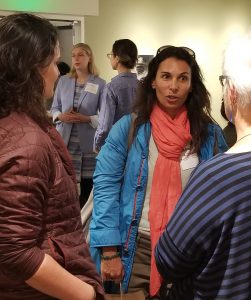
Photo courtesy of Michelle Brown
During the five breakout sessions a designated WEN board member sat in on each and reported back on their group’s discussion, identifying the valuable strengths women contribute to both recognizing and solving these critical issues. In each case, the board member recorded outcomes on Post-it Notes that were collected by runners and displayed for a debrief discussion and viewing by all.
We Gathered, We Discussed, We Identified Solutions: Reports From the Breakout Sessions
Chemical Pollution in our Bodies
During our session, moderator Pauli Ojea leveraged her expertise to manage a discussion centered on chemicals in our everyday lives. It focused on concerns surrounding chemicals: the pervasiveness of toxics in everything from food to cosmetics, the lack of information and transparency surrounding them, and societal dependence on these products. Another topic of conversation was the gendered “toxics burden” carried by women, who overwhelming carry the responsibility for feeding and purchasing decisions in a household. This means they are often the gatekeepers for what toxics enter the home.
The group shifted course and focused on concrete ways to tackle these issues, offering advice ranging from the simple and everyday—like referring to the Environmental Working Group mobile app to understand toxicity ratings in everyday home products—to evoking more widespread, systemic regulatory change imposing more stringent toxics regulation. Participants weighed in on the disciplines they were familiar with, such as education, media/communications, governance, corporate responsibility, environmental justice, and research. Many women remarked that it was refreshing to have the opportunity to discuss the topic of chemical pollution and toxicity, and left the table agreeing to keep in touch and elaborate further outside of the WEN event. – Ruby Tumber
Resources for the Next Generation
At this breakout group, moderated by Maia Piccagli, the topic appeared to resonate most with moms and moms-to-be. While there were women in the group not planning to have children, or not planning to have children anytime soon, those with kids chimed in loudest, expressing deep concern about the state of our planet from a resource perspective, and what that means for future generations. Topics of discussion included eco-anxiety, bees as pollinators and their importance in the food web, and the importance of community—specifically uniting on a local and regional level to solve the climate crisis, and relying on those support networks to get us through hard times.
The energy of the group was a mix of fear and empowerment, particularly as some women expressed slight apprehension for bringing children into this world given what we’re up against, while others felt children raised by climate-concerned parents would become “climate warriors” and would therefore be better equipped to fight for a sustainable planet. – Tara Holmes
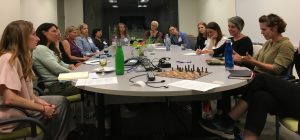
The eco-anxiety session talks it out. Photo courtesy of Nina Martin.
Eco-Anxiety
In our group, anchored by moderator Jamie Alexander, participants shared a wide array of ways the climate crisis evokes anxiety in their lives. Eco-anxiety isn’t going away anytime soon, so how do we leverage women’s strengths and insights to create a space allowing both vulnerability and support for each other and the cause? One key takeaway was that we feel better when we take action and do something—anything—positive. Qualities typically possessed by women were identified as being valuable tools of engagement, such as curiosity, empathy, collaboration, recognizing commonalities, celebrating the positives, and comfort with expression of feelings.
Some drew distinctions between gendered approaches, such as awareness of physiology’s role where women’s hormones are cyclical and vary from day to day, while testosterone is steady and generally ‘on.’ Another was the observation that men may be more likely to await an ‘eco-messiah’ (big tech solutions, e.g.), while women tend to feel urgency, diving in to break down the problem and start solving. Several women felt emboldened to express vulnerabilities they had never before uttered out loud, let alone among virtual strangers. To me, that said everything about the way women shine at creating a safe space where others can speak their truth. – Paula Swiatkowski
Dissolution of Resilient Communities
Moderated by Elizabeth Bagley, this session discussed how we’re facing rapidly deteriorating community structures where individuals feel disconnected, and as a group are ill-prepared for the uncertain conditions associated with climate change. To become more resilient, communities must enhance interpersonal connection, redundancy in ecosystem services, collaboration and shared intelligence, and emotional intelligence—as well as anticipate and respond to the crisis rather than being reactive.
The solutions ranged in scale from personal all the way to systemic. The common threads were: creating neighborhood-level connections and practice drills in case of an emergency; having early detection and response strategies for natural disasters; creating more localized systems for essential services and resources within individual communities; having more human-focused government; giving greater power to local governments/grassroots efforts for governance; and creating greater cross city/cross community task forces and working groups to share best practices with each other. – Shahira Esmail
Lack of Mentoring
During this discussion, moderator Sara Fuentes shared a point about men and women regarding mentorship. Men tend to approach mentoring with an abundance mindset, while women experience it from a scarcity mindset. And while it’s true that mentorship opportunities for men exist disproportionately to those available for women, openings for mentorship are more common than we think.
Too often we believe that mentorship can only exist from the top down—an accomplished expert in their field to someone who is just starting out, or an older person to someone younger. But the reality is that it can exist anywhere. You can learn from anyone; mentors could be your friends or peers. You can be mentored by someone who is younger than you. It can even occur from within yourself, by observing a colleague’s poor behavior and making a conscious choice not to model his or her actions.
When we serve as a mentor to others, we also serve as a mentor to ourselves. Sometimes we don’t do it out of fear that we’ll be wrong, but it’s this fear that immobilizes us, holding us back from learning and developing ourselves. Our takeaway: don’t be afraid to fail, and don’t be afraid to be wrong. We are more capable than we realize. – Joyce Ganthavorn
What About the Golden Nuggets Captured on Post-it Notes?
Post-it Notes can remind you of the little things you tend to forget… or the big things you need to remember. The #WENHackathon was filled with creative, driven women yearning to connect the dots on solutions. In breakout sessions, WEN leaders gathered ideas and solutions from participants on orange and pink Post-it Notes, which were arranged and displayed.
Ideas and solutions were then sorted into categories — “upstream/downstream,” “global/local,” “individual/systemic,” and so on. But very quickly WEN Board President Anya Deepak discovered that women don’t tend to think in neat, compartmentalized (or “compartmentalizable”) ways, so we were challenged with how to better organize the Post-its.
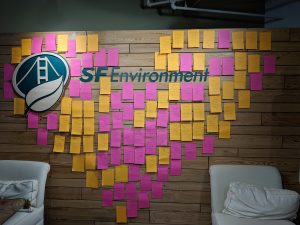
In the end we decided that rather than trying to break them into their component parts, they were best viewed together in the shape of a heart. It’s our hope that these Post-it Notes will serve to remind us that all we need are a few smart, capable women, some Post-its (and Thai food), and we can change the world! – Rebecca Boyles
Takeaways From Our Moderators
After the breakout sessions concluded, everyone regrouped and each moderator debriefed us with her key impressions from the group conversations:
Elizabeth Bagley, ‘Dissolution of Resilient Communities’ —
- Individual: Be proactive now. Make sure you know how to care for yourself and your family in case of disaster.
- Community: Strengthen the connections with your neighbors and network, so your community can better respond to a major event.
Pauli Ojea, ‘Chemical Pollution in our Bodies’ —
- Individual: A good rule of thumb when it comes to what products to bring into your home: If your grandmother wouldn’t recognize it, don’t use it.
- Community: Though it’s beyond our direct control, we must ask, ‘How can I help turn off the tap of toxics production?’
Sara Fuentes, ‘Lack of Mentoring’ —
- Individual: As Native Americans, we believe that what you take from Earth you must give back. I am doing this through education and mentorship.
- Community: Creating an inclusive workplace and building strong connections in our communities can support both social and environmental justice.
Maia Piccagli, ‘Resources for the Next Generation’ —
- Individual: Get involved. Join a group, volunteer, educate your friends, write to elected officials in support of resource conservation initiatives.
- Community: Increased diversity of all kinds makes us stronger. Encourage marginalized voices to speak up: if people feel part of the group and ownership of an issue, they’ll participate.
Jamie Alexander, ‘Eco-anxiety’ —
- Individual: Climate change is a deeply emotional topic that affects everyone differently. Remind yourself of all the good things going on.
- Community: Contribute your energy to a good cause; this will reduce the tendency to feel overwhelmed.
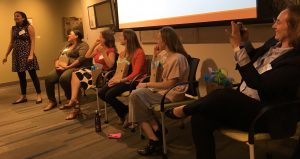
Anya Deepak thanks moderators (L-R) Sara Fuentes, Maia Piccagli, Pauli Ojea, Jamie Alexander, and Elizabeth Bagley. Photo courtesy of Tina Martin.
How We Go Forward From Here
It goes without saying that we all want a healthy planet, and that working to achieve it can feel overwhelming. Let’s acknowledge the deep emotions we feel around this, and mobilize them as a springboard to action by leaning on our unique strengths and insights.
“Analyzing all the solutions that came out of this event, one thing comes through clear as day,” says Deepak. “There are significant differences in the way women and men think about social and environmental issues, and these differences can highlight the path to solving issues on a systemic level that’s interwoven with the individual level.
“Traditional gender equality models rely on partitioning solutions on scales of formality and level of engagement. But the hackathon shows us that solutions that work merge those scales, because the problems are never packaged in neat little compartments.”
******
What if there’s a way to approach these solutions in a conscious and intentional way? Join the WEN Hackathon LinkedIn group and be part of designing a framework that does just that!
